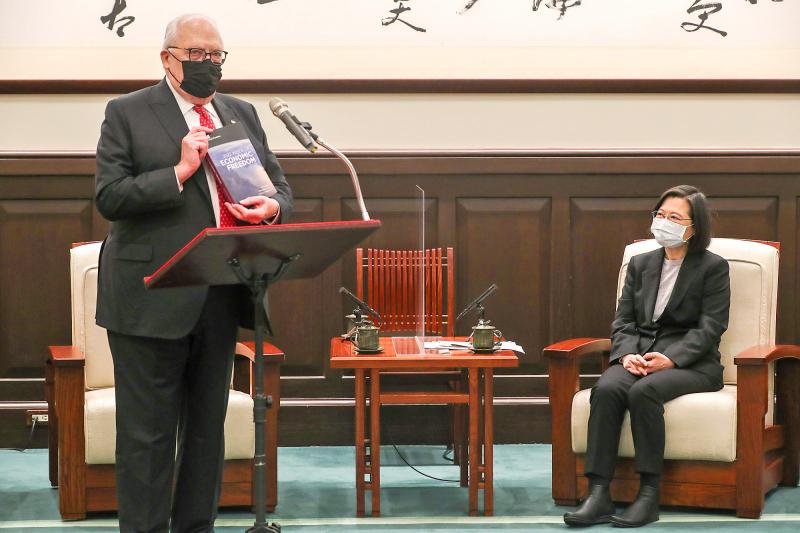Taiwan ranked sixth in this year’s Index of Economic Freedom, the same as last year, but its overall score gained 1.5 points to 80.1, joining the “Free” index category for the first time, thanks to improvements in judicial effectiveness and labor freedom, the Heritage Foundation said in an annual survey released yesterday.
The US think tank grades 12 indicators in 184 economies — from property rights to financial freedom — grouped into four categories: rule of law; government integrity; judicial effectiveness; and regulatory efficiency and open market.
“Taiwan is one of the few countries in the world to have experienced continuous economic growth during the past five years. Economic freedom has increased significantly during that period as well,” the Washington-based foundation said.

Photo: CNA
Taiwan ranked third among 39 nations in the Asia-Pacific region and its overall score was higher than the regional and global averages, the foundation said.
By comparison, South Korea was ranked 19th, Japan 35th and China 158th.
With strong scores across the board inflated by improved judicial effectiveness and labor freedom, Taiwan recorded a 3.6 point gain in economic freedom since 2017, it said.
The National Development Council said the government’s efforts to pursue economic freedom had paid off, adding that Taiwan now lags behind Luxembourg and New Zealand by just 0.5 points. Singapore leads the survey, followed by Switzerland and Ireland.
Taiwan’s judicial effectiveness scored 94.2, an increase of 21.3 points from a year earlier, the council said, adding that the nation gained 10 points in investment freedom to 70 and added 8.3 points to labor freedom at 68.7.
Taiwan’s currency freedom picked up 1.8 points to 86.1, but it lost points in business freedom, property rights, government integrity, government spending and fiscal health, the survey showed.
Additional improvements in business freedom and financial freedom would propel Taiwan’s economic freedom even higher, the foundation said.
Taiwan put up a flat showing in trade freedom and financial freedom from the previous year, it said.
Taiwan has six preferential trade agreements in force with the trade-weighted average tariff rate at 2 percent and 391 non-tariff measures in effect. Some agricultural imports face extra barriers, the survey found.
As of Dec. 1 last year, Taiwan had reported 848 deaths attributable to COVID-19 and the government’s response to the pandemic ranked 94th among nations in terms of its stringency, it said.
President Tsai Ing-wen (蔡英文) yesterday received representatives from the Heritage Foundation, including founder Edwin Feulner Jr and research fellow Anthony Kim, at the Presidential Office in Taipei.
Tsai outlined the government’s efforts and achievements in creating a more open economy and liberalized trade, and said she expects a closer Taiwan-US relationship in light of upcoming free-trade and digital economy talks between Taipei and Washington.
Feulner said that Taiwan is an important ally and a cornerstone of the US’ Indo-Pacific strategy.

The Central Election Commission has amended election and recall regulations to require elected office candidates to provide proof that they have no Chinese citizenship, a Cabinet report said. The commission on Oct. 29 last year revised the Measures for the Permission of Family-based Residence, Long-term Residence and Settlement of People from the Mainland Area in the Taiwan Area (大陸地區人民在台灣地區依親居留長期居留或定居許可辦法), the Executive Yuan said in a report it submitted to the legislature for review. The revision requires Chinese citizens applying for permanent residency to submit notarial documents showing that they have lost their Chinese household record and have renounced — or have never

A magnitude 5.6 earthquake struck off the coast of Yilan County at 12:37pm today, with clear shaking felt across much of northern Taiwan. There were no immediate reports of damage. The epicenter of the quake was 16.9km east-southeast of Yilan County Hall offshore at a depth of 66.8km, Central Weather Administration (CWA) data showed. The maximum intensity registered at a 4 in Yilan County’s Nanao Township (南澳) on Taiwan’s seven-tier scale. Other parts of Yilan, as well as certain areas of Hualien County, Taipei, New Taipei City, Taoyuan, Hsinchu County, Taichung and Miaoli County, recorded intensities of 3. Residents of Yilan County and Taipei received

Taiwan has secured another breakthrough in fruit exports, with jujubes, dragon fruit and lychees approved for shipment to the EU, the Ministry of Agriculture said yesterday. The Animal and Plant Health Inspection Agency on Thursday received formal notification of the approval from the EU, the ministry said, adding that the decision was expected to expand Taiwanese fruit producers’ access to high-end European markets. Taiwan exported 126 tonnes of lychees last year, valued at US$1.48 million, with Japan accounting for 102 tonnes. Other export destinations included New Zealand, Hong Kong, the US and Australia, ministry data showed. Jujube exports totaled 103 tonnes, valued at

BIG SPENDERS: Foreign investors bought the most Taiwan equities since 2005, signaling confidence that an AI boom would continue to benefit chipmakers Taiwan Semiconductor Manufacturing Co’s (TSMC, 台積電) market capitalization swelled to US$2 trillion for the first time following a 4.25 percent rally in its American depositary receipts (ADR) overnight, putting the world’s biggest contract chipmaker sixth on the list of the world’s biggest companies by market capitalization, just behind Amazon.com Inc. The site CompaniesMarketcap.com ranked TSMC ahead of Saudi Aramco and Meta Platforms Inc. The Taiwanese company’s ADRs on Tuesday surged to US$385.75 on the New York Stock Exchange, as strong demand for artificial intelligence (AI) applications led to chip supply constraints and boost revenue growth to record-breaking levels. Each TSMC ADR represents